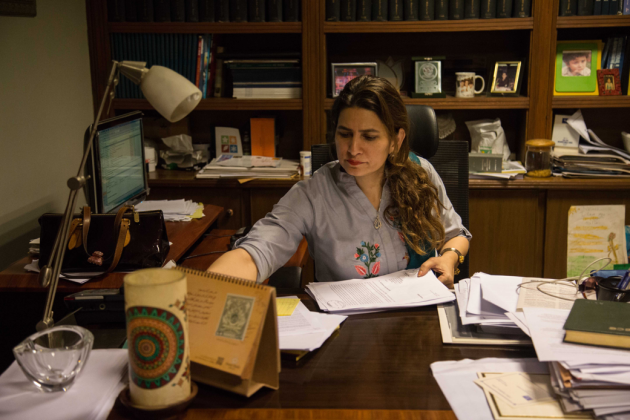

Huma Zaman is a person who is living her dream. All through school and college, theatre was her passion. Over the years, she performed at Punjab University, the Alliance Francaise and with various theatre groups all over Pakistan.
Though Huma is a lawyer and for a span of time her professional duties took over and theatre took a backseat. Yet last year, she decided to make a comeback with a group of like-minded theatre enthusiasts and founded the Lahore Amateur Theatre Zealots (LATZ).
Her vision for LATZ is to set up a platform “where actors and performers can find a medium through quality theatre to express and share their talents with others.”
LATZ has a rich pool of talent to dip into with the diverse experience of co-founders Omair Rana, Tughral A.T. Ali, and Tulin Khalid-Azim. Tughral trained as an actor in Paris and has directed several plays, while Omair Rana is a film and television actor who teaches dramatic arts. Tulin is an acting coach and art director.


The group intends to promote meaningful theatre with a fresh production every quarter. They have performed two plays in English and two in Urdu. While most theatre groups tend to depend on sponsors who give away complimentary tickets, LATZ produced its first two plays without a sponsor, managing to cover costs through ticket sales. Huma believes this is the way to revive a tradition of theatre where the audience is motivated and responds to the quality of the work.
For their first performance, LATZ adapted a Neil Simon classic into an Urdu piece for a contemporary Pakistani audience. It ran to full houses and critical acclaim at Lahore’s Alhamra theatre. The play, titled Dil-e-Nadaan, had a successful run in Karachi as well. They followed it up with a Neil Simon original satire, The Good Doctor, at Alhamra, followed by performances at Karachi’s National Academy for the Performing Arts (NAPA).
Art, a play by French playwright Yasmina Reza came next. It is a Tony award-winning play that has been produced in several languages. The play is a reflection on human relationships, the manner in which they evolve and the challenges they face.
Huma firmly believes that theatre can entertain at the same time that it inspires and provokes thought on the issues of the day. She encourages the group to explore different genres, from black comedy to tragedy. Some of the themes that have come up are poverty and class differences, the need for reflection and the nature of identity. Huma says LATZ has been able to tackle sensitive topics, keeping cultural sensitivities in mind.
To get the ball rolling, Huma used her own funds. Later the group began to gather some support and the plays turned over a modest profit. In Lahore, 80 percent seats are occupied at their performances, while in Karachi they sell out altogether.
Huma is convinced there is a market for quality theatre and says there is a gap that can be filled by groups such as LATZ. However, she does not have the resources to stage prolonged runs and the group has restricted its plays to three- day performances.
Among the challenges they face is the paucity of suitable theatres. “Lahore has just one good theatre, the Alhamra,” Huma says. “You cannot put up a quality performance in a shaadi hall.”
Huma keeps an eye on the business side of the enterprise. “At the end of the day you can love art,” she says. “But you need to have business sense to make it successful.” Keeping the need for business acumen in mind, Huma applied for entrepreneurship training supported by Karandaaz. She attended trainings held at LUMS for fifteen days and has kept up with follow-up sessions.
During the training, Huma says that she learnt how to pitch to investors and come up with a business model to take the business to the next level.
The Karandaaz Women Entrepreneurship Challenge (WEC), launched in 2017, aims to support women-led businesses by providing business development support as well as risk capital and grants so the enterprises can grow. In the first WEC round, Karandaaz partnered with three business incubators for the capacity building of women entrepreneurs. They are LUMS in Lahore, the Balochistan University of Information Technology, Engineering and Management Sciences (BUITEM) in Quetta and Invest2Innovate (i2i).
For the future, Huma would like to build up to two-week runs and also to explore plays in the Punjabi language. She aims to give employment to talented actors, build a talent pool for the revival of theatre, and eventually start a training institution for the dramatic arts. Hopefully, her business training will help her get there.
This story is brought to you by Karandaaz Pakistan
The Khyber Pakhtunkhwa government is considering partnering with Elon Musk’s Starlink to resolve ongoing internet…
For several years, Apple's cheapest iPad has been overlooked, continuing to run on the over…
A petition has been submitted to the Lahore High Court (LHC) seeking an emergency prohibition…
Xiaomi has officially expanded its global reach with the release of the Redmi Note 14…
Punjab schools will resume classes on January 13 after the winter break, with the Department…
Punjab Chief Minister Maryam Nawaz Sharif has introduced the Honhar Laptop Scheme 2025, a transformative…